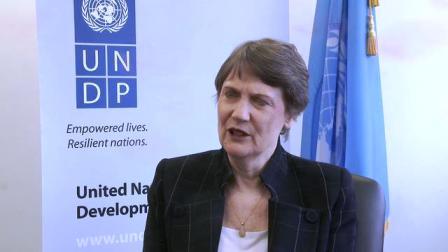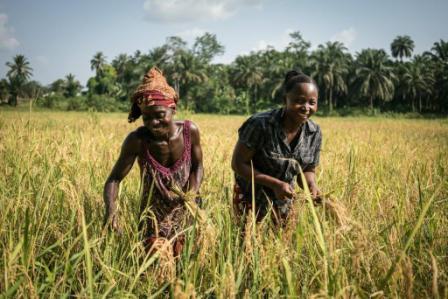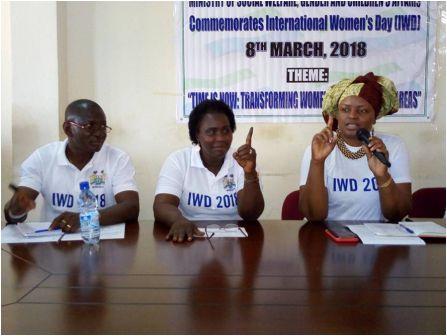UNDP chief calls for End to Violence Against Women
New York, 7 March 2013—United Nations Development Programme (UNDP) Administrator Helen Clark called Friday for scaled-up efforts globally to stop violence against women, calling it a weapon of war in much of the world and a major obstacle to equality and development.
On International Women’s Day, Helen Clark Says Much Work Remains
“Let’s mark International Women’s Day this year not only by recognizing the devastating impact of violence against women, but by renewing our collective efforts to stop it once and for all,” she said in a statement.
The theme for International Women’s Day 2013 is “A promise is a promise: Time for action to end violence against women.” It comes in the wake of a brutal, highly publicized gang-rape in Asia that focused unprecedented global attention on gender-based violence and sparked an international outcry.
“It is now time for increased action to end this abuse. In 1995, at the Fourth World Conference for Women, governments identified violence against women as a violation of human rights and an ‘obstacle to the achievement of the objectives of equality, development, and peace,” Helen Clark said.
“But the persistent prevalence of violence against women—experienced by up to seven in ten women at some point in their lifetime—shows that promises to end violence against women have not been met,” she said, calling for concerted efforts that bring together government, civil society, law enforcement and judicial systems.
UNDP Goodwill Ambassador and famed Spanish actor Antonio Banderas released a video statement as well on Friday, in which he eloquently enlists men as necessary foot soldiers in the growing movement to end violence and sexual abuse against women and girls, including trafficking, female genital mutilation and child marriage.
Up to 60 percent of women around the world experience some form of physical or sexual abuse during their life and as many as half of all sexual assault are against girls under the age of 16,” Banderas says in his video statement. “This is unacceptable and it has to stop now. Real men don’t hit women.”
Preventing and eliminating violence against women will require leadership and political will backed by action and resources, including the adoption and enforcement of national laws addressing and punishing all forms of violence against women and girls, according to Miss Clark and the UN agency that she heads. Currently, in more than 35 countries marital rape is not considered a criminal offense and more than 630 million women live in countries where domestic violence is not yet considered a crime.
Miss Clark made clear that violence against women has an important development component to it.
“This fight is not just an important end in itself,” she said in her statement. “Gender-based violence is a means by which inequalities between men and women are perpetuated throughout the world. As such, it is essential to address if we are to achieve the Millennium Development Goals and accelerate development progress more broadly.”
Violence against women is both a human rights violation and an impediment to sustainable development. Aside from significant health consequences, it harms women and girls over the long-term in areas ranging from education to employment and economic status, to participation in politics.
For example, in India a woman loses an average of at least five paid work days for each incident of intimate partner violence, while in Santiago, Chile, women who experience severe physical violence earn only 39 percent as much as women who do not suffer abuse.
Research from Australia, Canada, England and Wales and the United States suggests that the annual costs of such violence, including a range of costs such as responses to survivors and lost productivity, varies from US$1.16 billion to US$32.9 billion.
The costs are staggering for developing and middle-income countries as well. In Chile, women’s lost earnings as a result of domestic violence are estimated at US$1.56 billion or more than 2 percent of GDP. In Uganda, the cost of domestic violence was estimated at US$2.5 million in 2007.
Citing the last year of “shocking crimes” against women, UN Secretary-General Ban Ki-Moon said that this year, “We convert our outrage into action. We declare that we will prosecute crimes against women—and never allow women to be subjected to punishments for the abuses they have suffered.”
UNDP’s work
At least one-third of UNDP Country Offices are engaged in initiatives for preventing and responding to gender-based violence, including in crisis countries, where rape and sexual assaults are often used in as a “tool of war” to humiliate and shame women and men.
In Afghanistan, UNDP supported the establishment of a Human Rights Support Unit in the Ministry of Justice to review legislation, policy and practices on human rights compliance, resulting in improvements to several legislative documents, including the Law on Elimination of Violence Against Women. It also focused on the recruitment of female police, training and capacity development of the national police, and awareness-raising on gender issues.
In the Democratic Republic of the Congo, UNDP’s Access to Justice Programme has helped strengthen the capacities of police, judicial investigators, and prosecutors to work with victims of sexual and gender-based violence and supported mobile courts to bring justice services closer to communities.
In Iraq, UNDP supported five Family Protection Units, which provide services to survivors of gender-based violence and engaged with the government to develop relevant legislation. This contributed to Iraq’s allocation of land for additional Family Protection Units, as well as adoption of a domestic violence law in the Kurdistan region and draft law in Iraq.
In Kazakhstan, UNDP advocated for development and adoption of a domestic violence law and related law on equal rights. UNDP also helped implement gender mainstreaming of public resources at the local and national levels.
In Nepal, in 2012 UNDP continued to support greater access to justice for survivors of sexual or gender-based violence through seven legal aid desks operating in local police stations and offering legal information and assistance. The desks provided help to more than 1,200 claimants, 526 of which were related to domestic violence.
In Pakistan, UNDP strengthened and supported the development of legislation against acid crimes by funding two implementing partners, Acid Survivors Foundation and Social Organization for Care of Humanity, to advocate and promote passage of the Acid Crime Control and Prevention Bill through holding consultations with stakeholders.
In Paraguay, UNDP helped build police capacities to present and respond to gender-based violence, including domestic violence and trafficking. The support resulted in the development of safe spaces for women in six police stations.
In Timor Leste, UNDP supported awareness-raising and training of community leaders of the law on prevention of domestic violence, resulting in improved access of women to justice, evidenced by increase from 17 percent registered complaints in 2010 to 26 percent in 2011.
In Southeast Europe, UNDP supported the establishment of the Women’s Police Network, which brings together high-ranking police women representing nine police services in Southeast Europe. The network provides a platform for the exchange of experience and knowledge across police services in the region on the status, needs and priorities of police women.
UNDP
Stay with Sierra Express Media, for your trusted place in news!
© 2013, https:. All rights reserved.






